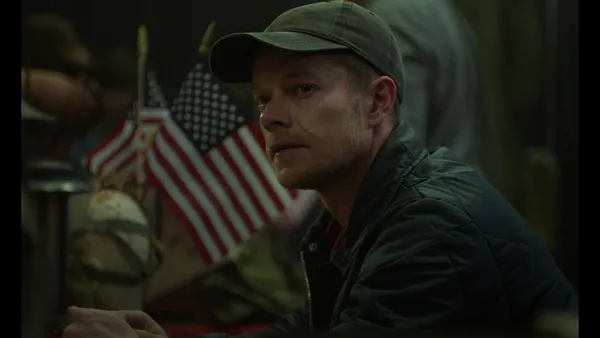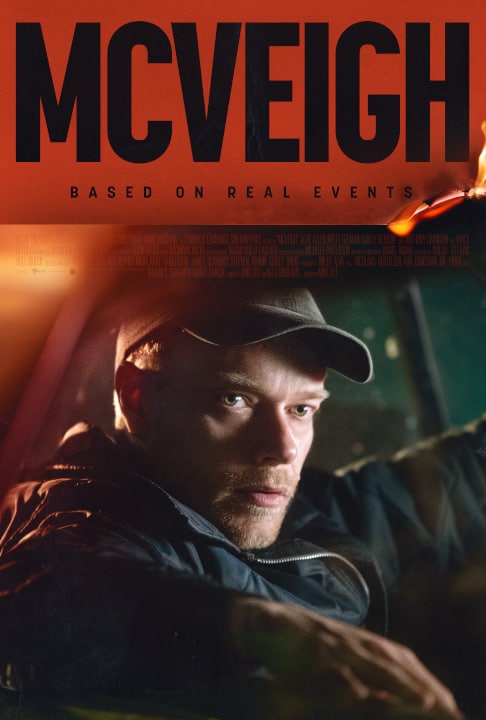Eye For Film >> Movies >> McVeigh (2024) Film Review
McVeigh
Reviewed by: Jennie Kermode

Cinema’s obsession with murderers – especially famous ones – seems never ending, yet the picture it paints is very different from reality. We’re all familiar with the latter-day movie archetype of the cool, charismatic killer, well dressed, bright-eyed, witty and smarter than everyone around him. Whilst a few well known murderers have perceived themselves that way, the reality tends to be very different. How does one successfully tell a story about someone who is socially withdrawn, living along, rarely speaking even when he is in company? How does one illustrate the development of his ideas when he keeps his thoughts locked up inside his head? Tony Stone tried it in 2001 with Ted K, his take on the story of the Unabomber, and now Mike Ott is here, taking a similar approach, with McVeigh.
It all hinges on finding the right actor. Whilst he’s no Sharlto Copley, Alfie Allen has acquitted himself well in a number of difficult roles, not least as Theon Greyjoy in Game Of Thrones. He easily captures McVeigh’s trademark awkward stare and, though convincingly inscrutable to other characters around him, shares with viewers a good deal of what’s going on behind it. We also learn about the bomber from his modest cabin home, from his choice of reading material and his choice of what to watch on television, and from the awkwardness of his relationship with waitress Cindy (Ashley Benson), whom he superficially desires but has no real chemistry with.
There’s a lot more chemistry between this version of McVeigh and his male associates, especially mysterious French-Canadian Frédéric (Anthony Carrigan), who approaches him at a gun store and introduces him to a community of right-wing extremists. This connection, however, feeds into McVeigh’s paranoia, his fear of entrapment by agents of the state which he feels certain is against him. Obsessively watching footage of the 1993 Waco siege, he develops a deep mistrust of government, and this in turn is fed by white supremacist murderer Richard Snell (Tracy Letts), whom he regularly visits in prison. Not just a political ally, Snell is his confidante, giving the troubled loner something like paternal advice. As the date of his execution draws near, one can feel the pressure within McVeigh increasing. He is anticipating a bereavement due to the actions of his enemy. He cannot stop it. He wants to strike back.
There is a lot of extrapolation here from real life events regarding which the evidence is thin, but it’s not necessarily a problem. Ott’s interest is not in creating an accurate depiction of exactly what happened in the run-up to the Oklahoma City bombing, but rather in exploring the thought processes behind it. One might easily conjecture that some of the people McVeigh meets exist only in his head. His only definite real world connection is with co-conspirator Terry Nichols (Brett Gelman), who is presented as a weaker man but one much more firmly rooted in the world, with practical connections which facilitate McVeigh’s plans. A bleakly comedic subplot concerning Gelman’s relationship with his mail order Filipina wife illuminates something of the men’s cultural background whilst adding an element of pathos. Though one of the real life tragedies she suffered is elided here, as are the couple’s two children, we still get a sense of how the men’s obsession ruined lives they personally cared about as well as those of countless strangers.
Beyond the retelling and sometime restructuring of events, the film’s power comes from the way that Ott and cinematographer Daniel Vignal frame them. There are some really impressive choices here, with individual shots that will stick in your memory. Overall, the camera keeps its distance, observing McVeigh the way he observes his target. We are also shown, again and again, landscapes which could be beautiful but whose appeal is ruined by the presence of some crumbling concrete structure or other industrial intrusion, something torn or broken. The impression this creates is of a world never treated with care – even the light does not flatter it – which helps us to relate to McVeigh’s sense of disconnection and despair,
There is, in this, no particular invitation to sympathy. Ott is not asking us to forgive; his interest is more clinical. Allen lets us see his character’s humanity but keeps it tightly wound. This is a man who has become alienated long before we meet him. He moves through the world with his guard up, all the time. In this he is not all that unusual, but his proximity to right wing extremism brings out something more dangerous. McVeigh once described himself as a man with nothing to lose, and Allen makes that believable. Even in the midst of a passionate embrace, he does not feel fully present.
There may be a lot of films out there about killers, but there are still few that feel real. Ott has added to their number. That’s no small achievement.
Reviewed on: 08 Mar 2025
















